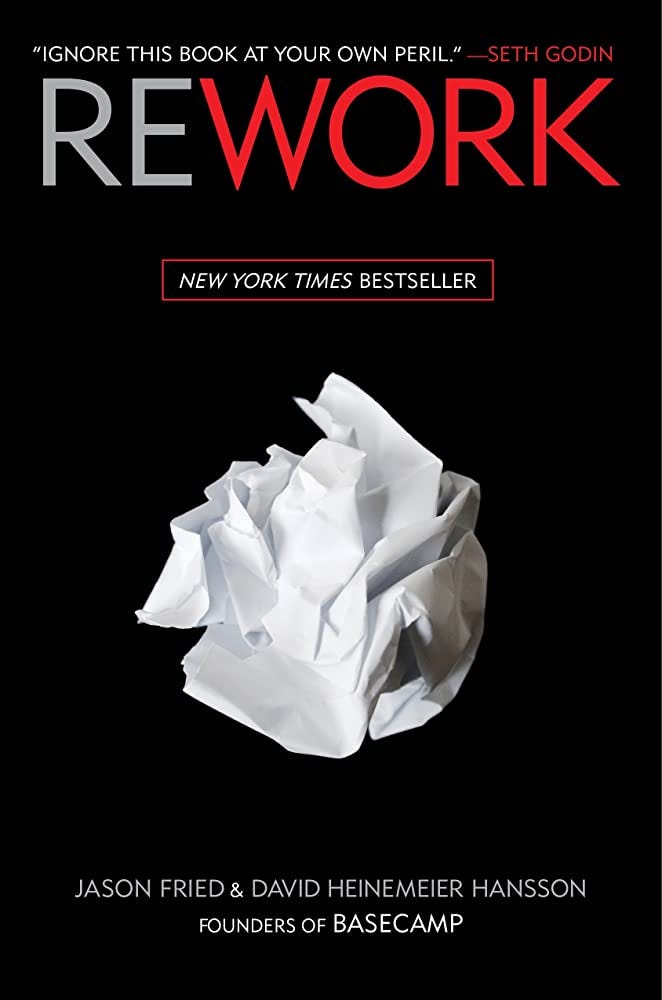Hi all,
In today’s note, I wanted to share a few unique and somewhat unconventional ideas that I’ve re-discovered or encountered in the last week. I hope you find these as thought-provoking as I did.
In other news, I’ve been sedulously studying for the GRE and augmenting my arsenal of arcane vocabulary words. Below are a few of my favorite new ones:
Arriviste (n.): a person who has recently acquired unaccustomed status, wealth, or success, especially by dubious means and without earning concomitant esteem
Sinecure (n.): a position requiring little or no work but giving the holder status or financial benefit
Pleonastic (adj.): using more words than are needed to express a meaning, either unintentionally or for emphasis
Hopefully I avoid pleonastic writing!
Thank you,
Brendan
#1: Rework’s “Takedowns”
Jason Fried and David Heieneier Hansson are entrepreneurs and founders of the successful software company 37signals, which has chosen to remain a very small but highly profitable private organization. In Rework, Fried and Hansson offer unique yet cogent thoughts on work and business that have stuck with me over the years. Below are just a few:
Learning from mistakes is overrated. Failing hurts twice as much as winning feels good. But don’t over-index on failures. It’s success we want to replicate.
Why grow? Growth is often what destroys what’s great about an organization’s product or workplace culture. It’s ok to be great instead of big. Don’t grow just to impress others.
Workaholism. “Workaholics aren’t heroes. They don’t save the day, they just use it up. The real hero is already home because she figured out a faster way to get things done.”
#2: “I don’t run for trains.” —Nassim Taleb
As he clarifies further in The Black Swan, Taleb explains that…
“In refusing to run to catch trains, I have felt the true value of elegance and aesthetics in behavior, a sense of being in control of my time, my schedule, and my life. […] Likewise, not matching the idea of success others expect from you is only painful if that’s what you are seeking.”
I can’t say I could follow this exact same train-running rule in practice. I’m neurotic about being on time, and as a runner, I almost enjoy the challenge of hurling through the maw of a pungent Frankford-bound subway car moments before its jaws shut.
In principle, though, Taleb is so on point. Metaphorically, a person who runs after a train is frantically grasping to catch something just out of reach. They are not traveling at their own pace, but striving to keep up… and to what end? To shave a few minutes from their commute?
It’s a reminder to reflect on the degree of control we have over the pace we’re running at.
#3 Why write?
“[I]f you need to solve a complicated, ill-defined problem, it will almost always help to write about it. Which in turn means that someone who's not good at writing will almost always be at a disadvantage in solving such problems. You can't think well without writing well, and you can't write well without reading well.”
—Paul Graham (“The Need to Read”)
I sometimes feel embarrassed that I spend several hours per week writing and building this newsletter if it’s not returning any monetary value. What exactly is writing teaching me? Why is it critical to know how to write if ChatGBT is already 80% the way there—and apparently closing the gap?
The answer, I’ve started to piece together, is that writing is a form of thinking. Rarely does a writer start a piece with a clear idea of what they’d like to say. The process of writing itself is how they generate, capture and refine their thinking on a particular subject until it’s clear to them, and hopefully, the reader too.
Practice writing and you practice thinking. Practice thinking and you practice problem-solving, idea generation, and developing your own perspective on things. These are ever-important skills and critical for building what David Perell calls a Personal Monopoly.
Journaling, something anyone can do, is how I started writing 6+ years ago.
Thanks for reading! I love when these thoughts lead to conversations with readers. Did you find anything interesting or surprising? Reply to me and let’s have a dialogue.







